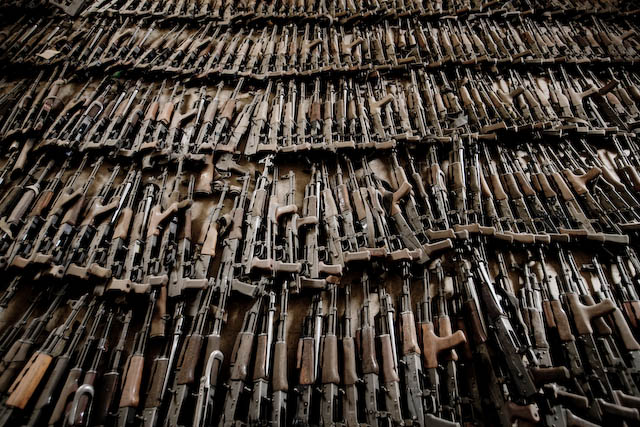 |
| Picture Credit: zoriah.com |
Coalition Forces have used indiscriminate and especially injurious weapons in Iraq that are banned by international conventions or widely considered unacceptable. The US has extensively used a napalm-type incendiary bomb known as MK-77 that is considered inhumane by many human rights organizations as it burns victims to death. Further, the US made use of white phosphorus against ground targets in densely populated areas, which causes grave injuries.
During the 2003 invasion, the Coalition also used cluster bombs and depleted uranium, a radioactive substance which may have long-term harmful effects on the environment and on human health. The use of these weapons is strictly prohibited under international law, as they do not distinguish between combatants and non-combatants and cause indiscriminate harm and unnecessary suffering.
UN Documents
See GPF Report on Iraq: Indiscriminate and Especially Injurious Weapons (June 2007)
US Coalition forces have used indiscriminate and especially injurious weapons that are banned by international convention or widely considered unacceptable and inhuman. The US used a napalm-type incendiary weapon as well as white phosphorous munitions, the latter against ground targets in densely populated areas. During the 2003 invasion, the US Coalition also made use of depleted uranium munitions and cluster bombs. Both violate prohibitions against weapons that cause unnecessary suffering and indiscriminate harm.
Assessment of Environmental "Hot Spots" in Iraq (November 2005)
Iraq’s environment has suffered from years of conflict and neglect. According to this report from the United Nations Environment Program (UNEP), thousands of sites have been heavily contaminated with toxic compounds, chemicals, and pesticides. The report, which assesses five "hot spots" bombed or looted during the US-led invasion, highlights Iraq's environmental and public health risks.
Fire Bombs in Iraq: Napalm by Any Other Name (March 2005)
Articles
2009 | 2008 | 2007 | 2006 | Archived Articles
2009
Huge Rise in Birth Defects in Fallujah (November 13, 2009)
Doctors in Fallujah are witnessing an unprecedented and dramatic increase in birth defects - with fifteen times more babies being born with multiple tumors and central nervous system problems. Iraqi and British doctors and officials have petitioned the UN General Assembly to request that an independent committee investigate this health crisis. Although the reasons behind these defects are not fully known, several health officials believe that they may be linked to the fighting in Fallujah, where controversial weapons - such as white phosphorus - were used by the US. (Guardian)
2008
"Special Weapons" Have a Fallout on Babies (June 12, 2008)
A large number of babies born in the city of Fallujah suffer from illness and deformity like Down's syndrome, weak hearts and brain damage. Doctors believe the incidents are due to the toxic and radioactive material used by the US military in two massive bombing campaigns on the city four years ago. According to Inter Press Service, toxic materials have severely increased the rate of cancer in Iraq, as well as among US veterans who served in the Gulf War and Iraq. (Inter Press Service)
Unit Member Says "Fighting 69th" Victimized by Depleted Uranium (January 28, 2008)
This American Free Press article highlights the plight of forgotten US troops suffering from the cancerous effects of depleted uranium, a substance used extensively in US ordnance. US soldiers have been deterred from seeking medical care from private hospitals and refused the "line-of-duty" status, which would expedite treatment from military facilities. The US army ignores the soldiers' pleas for medical aid and legislators claim helplessness before the military.
2007
Cluster Bombs in Iraq: The Deadly Footprint (November 5, 2007)
Humanitarian agencies claim Coalition forces have used over 13,000 cluster bombs in heavily populated areas of Iraq since 2003. Cluster bombs are known for their devastating effects on large areas as each canister contains smaller sub-munitions or "bomblets." According to the author of this Common Dreams article, in some civilian areas between 75 and 80 percent of all casualties are due to the bombs. While the US refuses to provide agencies with details on where the bombs are dropped, efforts to clear Iraq of the weapons may take decades.
US Doubles Air Attacks in Iraq (June 5, 2007)
Did the US Lie About Cluster Bomb Use in Iraq? (May 24, 2007)
The Legacy of Fallujah (April 4, 2007)
2006
Sickened Iraq Vets Cite Depleted Uranium (August 13, 2006)
Iraq Mess Is Literally Making People Sick (April 10, 2006)
Willy Peter (January 2006)

